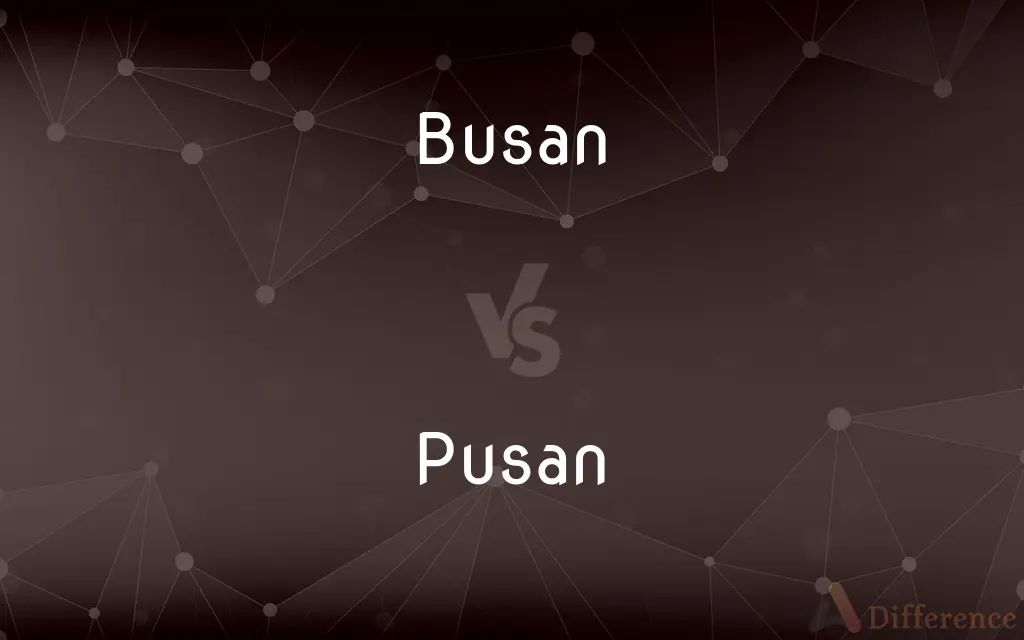Busan vs. Pusan — What's the Difference?
By Tayyaba Rehman & Fiza Rafique — Updated on March 19, 2024
Busan is the modern romanization of South Korea's second-largest city, emphasizing its contemporary status, whereas Pusan refers to the city's older romanization, highlighting its historical context.

Difference Between Busan and Pusan
Table of Contents
ADVERTISEMENT
Key Differences
Busan is now the standardized romanization based on the current South Korean government's guidelines, reflecting a more accurate representation of the Korean pronunciation. On the other hand, Pusan is how the city's name was romanized under the McCune-Reischauer system, which was used in South Korea before the current system.
This Busan change is part of an effort to standardize the Romanization of Korean names and places, aiming to reduce confusion and promote consistency in the international community. The older name Pusan is still found in historical documents, older maps, and is recognized by people familiar with South Korea before the change.
Busan, as a major international city, has seen significant development in recent years, including hosting major global events like the Busan International Film Festival, which attracts visitors and filmmakers worldwide. Whereas, references to Pusan often evoke the city's rich historical and cultural past, including its strategic importance during the Korean War and its role as a major port city, which played a significant role in South Korea's economic development.
Busan's current prominence in South Korea's tourism, culture, and economy is often highlighted in discussions about the city, showcasing its modern infrastructure, beautiful beaches, and dynamic urban environment. Whereas Pusan might be referenced in discussions focusing on historical contexts or when referring to events and places tied to periods before the romanization change, offering a glimpse into the city's past and its evolution over the years.
Comparison Chart
Romanization
Current official romanization
Older romanization under previous system
ADVERTISEMENT
Pronunciation Guide
Closer to Korean pronunciation
Reflects older international understanding
Usage Context
Modern references and official documents
Historical contexts and older documents
Cultural Significance
Highlights contemporary status and development
Emphasizes historical importance and past events
Recognition in Literature
Used in contemporary literature and media
Appears in historical texts and older publications
Compare with Definitions
Busan
A key economic hub and port city.
Busan's port is among the busiest in the world.
Pusan
Reflects the city's past before modern romanization.
Pusan National University was established when the city was known by this name.
Busan
Known for its seafood and fish markets.
Jagalchi Fish Market in Busan offers a variety of seafood.
Pusan
Historical name of South Korea's second-largest city.
Pusan was a critical port during the Korean War.
Busan
A city with a mix of modern and traditional elements.
Busan Tower provides a panoramic view of the city.
Pusan
Often mentioned in historical contexts.
The Pusan Perimeter was a key battleground during the Korean War.
Busan
A major city in South Korea known for its beaches.
Haeundae Beach is a popular destination in Busan.
Pusan
Used in older documents and maps.
Older maps of South Korea list the city as Pusan.
Busan
Host city of the Busan International Film Festival.
The Busan International Film Festival showcases Asian cinema.
Pusan
Evokes a sense of nostalgia and heritage.
Many older residents still refer to the city as Pusan.
Busan
Busan (Korean pronunciation: [pu.sa̠n]), officially known as Busan Metropolitan City, is South Korea's second-most populous city after Seoul, with a population of over 3.4 million inhabitants. Formerly romanized as Pusan, it is the economic, cultural and educational center of southeastern South Korea, with its port being Korea's busiest and the sixth-busiest in the world.
Pusan
A city in southeastern South Korea on the Korean Strait; the chief port and second largest city
Common Curiosities
Can both names still be used interchangeably?
While Busan is preferred in official and modern contexts, Pusan may still be used in historical references or older documents.
Which romanization is officially recognized by South Korea?
Busan is the officially recognized romanization under the current system.
Is the pronunciation of Busan and Pusan different in Korean?
No, the pronunciation in Korean is the same; the difference lies in the romanization for English speakers.
What major event is Busan famous for hosting?
Busan is famous for hosting the Busan International Film Festival.
Can tourists find places in Busan still labeled with Pusan?
It's rare, as most signs and documents have been updated, but some historical references might still use Pusan.
What is the main difference between Busan and Pusan?
The main difference is the romanization; Busan is the modern, standardized romanization, whereas Pusan is the older version.
Why is the name Pusan significant in historical contexts?
Pusan holds historical significance due to its role in events like the Korean War and its economic development history.
How has Busan's importance changed over time?
Busan has grown from a strategic port city to a major cultural and economic center in South Korea.
What was the role of Pusan during the Korean War?
Pusan was a critical evacuation and military base during the Korean War.
Why did Pusan change to Busan?
The change reflects South Korea's adoption of a new romanization system to better represent Korean pronunciation internationally.
Are Busan and Pusan the same city?
Yes, they refer to the same city in South Korea, with the name difference due to romanization changes.
How do the names Busan and Pusan reflect on the city's identity?
Busan reflects its modern, dynamic identity, whereas Pusan highlights its historical and cultural heritage.
What is Busan known for?
Busan is known for its beautiful beaches, vibrant city life, and as a major economic hub.
What are some must-visit places in Busan?
Haeundae Beach, Jagalchi Fish Market, and Busan Tower are among the top attractions.
Do older generations in Korea still use the name Pusan?
Yes, some older generations might still refer to the city as Pusan out of habit or nostalgia.
Share Your Discovery

Previous Comparison
Faraway vs. Far
Next Comparison
Sublime vs. DivineAuthor Spotlight
Written by
Tayyaba RehmanTayyaba Rehman is a distinguished writer, currently serving as a primary contributor to askdifference.com. As a researcher in semantics and etymology, Tayyaba's passion for the complexity of languages and their distinctions has found a perfect home on the platform. Tayyaba delves into the intricacies of language, distinguishing between commonly confused words and phrases, thereby providing clarity for readers worldwide.
Co-written by
Fiza RafiqueFiza Rafique is a skilled content writer at AskDifference.com, where she meticulously refines and enhances written pieces. Drawing from her vast editorial expertise, Fiza ensures clarity, accuracy, and precision in every article. Passionate about language, she continually seeks to elevate the quality of content for readers worldwide.















































